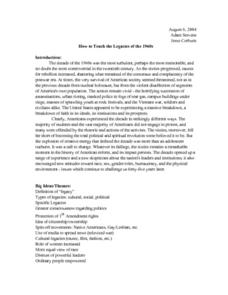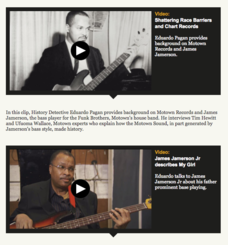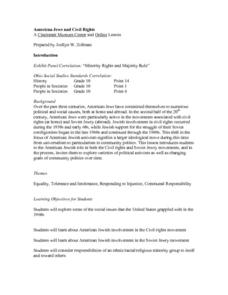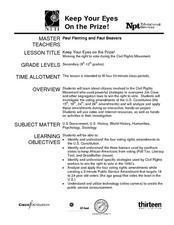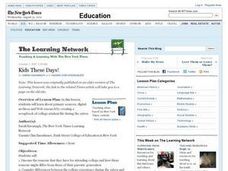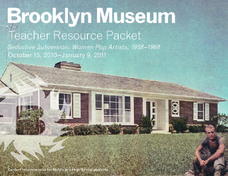American Institute of Physics
African American Physicists in the 1960s
Physicists Herman Branson and Tannie Stovall provide young scholars with two very different perceptions of the status of African American physicists in the 1960s. After reading and comparing the bios of these two men, class members read...
Curated OER
How to Teach the Legacies of the 1960s
Learners consider which aspects of world around them have roots in 1960s, research and compare 1960s to today with regards to Civil and Women's Rights, Vietnam, counterculture, music, voting, and economic rights, and explore legacy of...
Curated OER
Slices of American Pie: The 1960s Through Music
Eleventh graders examine political, cultural, and social movements through music. In this 1960s American history lesson, 11th graders explore the music of the decade in order to better understand the complexity of the time period....
Curated OER
1960 America: Foreign Policy
The 1960's marked shifts in American culture, politics, and policy. Your class groups up to research a series of primary source documents resulting in a timeline and a 15 minute oral presentation. Active learning all the way.
Curated OER
Groovy 60s Dances!
1960s dances: The Twist, The Jerk, The Swim, The Monkey, The Mashed Potato, The Watusi, The Hitchhiker, and The Boog-a-loo. Introduce your class to the dances of the 60s. Find Motown music, watch online videos that show the different...
Curated OER
Finding Our Place in Time
Students utilize interviewing skills of an historian to research the time period of the 1970's. They use prior knowledge of the 1960's to explain the mood of the country in the 1970's.
Curated OER
Activating Students
Students view and analyze one example of student activism in the 1960's and then apply their learning to their own situations. They work cooperatively to develop and implement their own "activist" or community service learning plan.
Curated OER
Desegregation of Schools
Students explore ways African American students were discriminated against in the 1960's. In this United States History lesson, students read three famous poems on the Civil Rights Movement then write their own poem.
Curated OER
Dominican Immigration: Understanding the Push-Pull Factors of Immigration to the United States in the 1960's
Students complete a unit about the history and geography of the Dominican Republic and the reasons for Dominican immigration to the U.S. in the 1960's. They conduct Internet research, write a biographical sketch of Raphael Trujillo, and...
PBS
The Sixties: Hitsville USA
James Jamerson. You probably heard him but may not have heard of him. But fans of Motown Records will certainly recognize his contributions to the sound that desegregated popular music during the 1960s. Challenge young history detectives...
National Woman's History Museum
Defying Expectations: Unsung Hero: Marsha P. Johnson and the Stonewall Riots
The 1960s were a turbulent time, but the charismatic figure of Marshal P. Johnson is often left out of the provocative stories of the era. With primary sources that talk about Johnson and her role in the Stonewall Riots, scholars unpack...
Curated OER
Taxes in U.S. History: Tax Reform in the 1960s and 1980s
Students explain the content, purpose, and impact of the Tax Reform Acts of 1969 and 1986.
National Endowment for the Humanities
The Freedom Riders and the Popular Music of the Civil Rights Movement
The Civil Rights Movement of the 1960s marched to its own beat—literally. Using songs from the era, as well as other primary sources such as King's "I Have a Dream" speech, class members analyze lyrics to discover how music and protest...
National Endowment for the Humanities
Revolution '67, Lesson 2: What Happened in July 1967? How Do We Know?
Even in a world in which dozens of participants and curious onlookers record every controversial event, the basic facts of what happened are often in dispute. Revolution '67, Lesson 2 explores 1967 Newark, New Jersey using an examination...
Curated OER
American Jews and Civil Rights
Tenth graders examine the Civil Rights movement of the 1960's and how American Jews were involved. They discuss the responsibilities of any minority or ethnic group. They consider the process of change in politics as well.
National Endowment for the Humanities
Martin Luther King, Jr. and Nonviolent Resistance
Was nonviolent resistance the best means of securing civil rights for black Americans in the 1960s? For this highly engaging and informative lesson, your young historians will closely analyze several key documents from the civil rights...
PBS
Making Change: Revolutionary Tactics of the Civil Rights Movement
The film American Revolutionary: The Evolution of Grace Lee Boggs introduces viewers to the differing philosophies of and strategies employed by 1960s civil rights leaders such as Malcolm X and Martin Luther King, Jr. and the debate over...
Curated OER
JFK, LBJ, and the Fight for Equal Opportunity in the 1960s
Students examine the presidencies and John F. Kennedy and Lyndon B. Johnson. In this American history lesson, students specifically analyze the civil rights support of the 2 presidents and their support of civil rights legislation....
Curated OER
Keep Your Eye On the Prize
High schoolers learn about citizens who were actively involved in the civil rights movement, and the strategies they used to overcome the Jim Crow laws that were so prevalent in the 1960s. They investigate the voting amendments of the US...
Curated OER
Guess Who's Coming to Dinner?
Who would you love to see at your table? Groups research a decade, ranging from the 1840s to the 1960s, read a short story associated with that decade, and plan a dinner party, complete with table set-up and menu. After researching...
Curated OER
Kids These Days!
Students create a scrapbook of college student life during the 1960's using digital archives and Internet research. They read and discuss the article "What's the Matter With College?" and then compare college experience of today with...
PBS
The Sixties: Dylan Plugs in and Sells Out
Before Woodstock, there was Newport. Get plugged in to the social changes of the 1960s with a lesson that looks at Bob Dylan's performance at the 1965 Newport Folk Festival as a symbol of the radical changes that marked the era.
Curated OER
Sondheim: Voice of Cultural Change
Students explore Stephen Sondheim's contributions to musical theatre in the context of the dramatic cultural shift that occurred in American life in the late 1950s, 1960s, and 1970s.
Brooklyn Museum
Seductive Subversion: Women Pop Artists, 1958–1968
What role did women play in pop art during the 1950s and 1960s? The class researches the role of women in mid-century America and how those roles were portrayed through the pop art of the time. They use an excellent set of guiding...
Other popular searches
- 1960's Protest Songs
- 1960's Music
- 1960s Space Race
- 1960's Civil Rights Movement
- 1960's Folk Music
- Women's Rights 1960s
- Women's History of 1960's
- 1960s Hippies
- 1960s Projects
- 1960s America
- 1960s Pop Culture
- Culture of the 1960's



